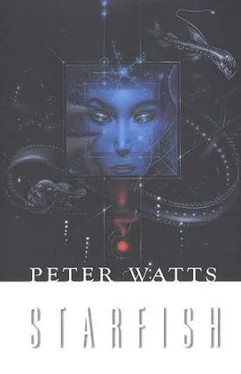Peter Watts - Starfish
Здесь есть возможность читать онлайн «Peter Watts - Starfish» весь текст электронной книги совершенно бесплатно (целиком полную версию без сокращений). В некоторых случаях можно слушать аудио, скачать через торрент в формате fb2 и присутствует краткое содержание. Год выпуска: 1999, Жанр: Фантастика и фэнтези, на английском языке. Описание произведения, (предисловие) а так же отзывы посетителей доступны на портале библиотеки ЛибКат.
- Название:Starfish
- Автор:
- Жанр:
- Год:1999
- ISBN:нет данных
- Рейтинг книги:3 / 5. Голосов: 1
-
Избранное:Добавить в избранное
- Отзывы:
-
Ваша оценка:
- 60
- 1
- 2
- 3
- 4
- 5
Starfish: краткое содержание, описание и аннотация
Предлагаем к чтению аннотацию, описание, краткое содержание или предисловие (зависит от того, что написал сам автор книги «Starfish»). Если вы не нашли необходимую информацию о книге — напишите в комментариях, мы постараемся отыскать её.
Starfish — читать онлайн бесплатно полную книгу (весь текст) целиком
Ниже представлен текст книги, разбитый по страницам. Система сохранения места последней прочитанной страницы, позволяет с удобством читать онлайн бесплатно книгу «Starfish», без необходимости каждый раз заново искать на чём Вы остановились. Поставьте закладку, и сможете в любой момент перейти на страницу, на которой закончили чтение.
Интервал:
Закладка:
Joel's heard this before. The punchline's got something to do with a broken clock, if he remembers it right.
"These things teach themselves from experience, right?" Jarvis continues. "So everyone just assumed it had learned to cue the ventilators on something obvious. Body heat, motion, CO 2levels, you know. Turns out instead it was watching a clock on the wall. Train arrival correlated with a predictable subset of patterns on the digital display, so it started the fans whenever it saw one of those patterns."
"Yeah. That's right." Joel shakes his head. "And vandals had smashed the clock, or something."
"Hey. You did hear about it."
"Jarvis, that story's ten years old if it's a day. That was way back when they were starting out with these things. Those gels have been debugged from the molecules up since then."
"Yeah? What makes you so sure?"
"Because a gel's been running the lifter for the better part of a year now, and it's had plenty of opportunity to fuck up. It hasn't."
"So you like these things?"
"Fuck no," Joel says, thinking about Ray Stericker. Thinking about himself. "I'd like 'em a lot better if they did screw up sometimes, you know?"
"Well, I don't like 'em or trust 'em. You've got to wonder what they're up to."
Joel nods, distracted by Jarvis' digression. But then his mind returns to dead tube worms, and undeclared no-dive zones, and an anonymous canister drenched with enough poison to kill a fucking city.
I've got to wonder what all of us are.
Ghosts
It's hideous.
Nearly a meter across. Probably smaller when Clarke started working on it, but it's a real monster now. Scanlon thinks back to his v-school days, and remembers: starfish are supposed to be all in one plane. Flat disks with arms. Not this one. Clarke has grafted bits and pieces together at all angles and produced a crawling Gordian knot, some pieces red, some purple, some white. Scanlon thinks the original body may have been orange, before.
"They regenerate," she buzzes at his shoulder. "And they've got really primitive immune systems, so there's no tissue rejection problems to speak of. It makes them easier to fix if something goes wrong with them."
Fix. As if this is actually some sort of improvement. "So, it was broken?" Scanlon asks. "What was wrong with it, exactly?"
"It was scratched. It had this cut on its back. And there was another starfish nearby, all torn up. Way too far gone for even me to help, but I figured I could use some of the pieces to patch this little guy together."
This little guy. This little guy drags itself around between them in slow pathetic circles, leaving tangled tracks in the mud. Filaments of parasitic fungus trail from ragged seams, not quite healed. Extra limbs, asymmetrically grafted, catch on rocks; the body lurches, perpetually unstable.
Lenie Clarke doesn't seem to notice.
"How long ago— I mean, how long have you been doing this?"
Scanlon's voice is admirably level; he's certain it conveys nothing but friendly interest. But somehow she knows. She’s silent for a second, and then she points her undead eyes at him and she says, “Of course. It makes you sick.”
“No, I’m just— well, fascinated, I—”
"You're disgusted," she buzzes. "You shouldn't be. Isn't this exactly the sort of thing you'd expect from a rifter? Isn't that why you sent us down here in the first place?"
“I know what you think, Lenie,” Scanlon tries, going for the light touch. "You think we get up every morning and ask ourselves, How can we best fuck over our employees today?"
She looks down at the starfish. "We?"
"The GA.”
She floats there while her pet monster squirms in slow motion, trying to right itself.
"We're not evil, Lenie," Scanlon says after a while. If only she’d look at him, see the earnest expression on his helmeted face. He’s practiced it for years.
But when she does look up, finally, she doesn’t even seem to notice. "Don't flatter yourself, Scanlon,” she says. “You don't have the slightest control over what you are."
TRANS/OFFI/280850:1043
There's no doubt that the ability to function down here stems from attributes which would, under other conditions, qualify as «dysfunctional». These attributes not only permit long-term exposure to the rift; they may also intensify as a result of that exposure. Lenie Clarke, for example, has developed a mutilation neurosis which she could not have had prior to her arrival here. Her fascination with an animal which can be easily «fixed» when broken has fairly obvious roots, notwithstanding a number of horribly botched attempts at «repair». Judith Caraco, who used to run indoor marathons prior to her arrest, compulsively swims up and down Beebe's transponder line. The other participants have probably developed corresponding habits.
Whether these behaviors are indicative of a physiological addiction I can not yet say. If they are, I suspect that Kenneth Lubin may be the furthest along. During conversation with some of the other participants I have learned that Lubin may actually sleep outside on occasion, which can not be considered healthy by anyone's standards. I would be better able to understand the reason for this if I had more particulars about Lubin's background. Of course, his file as provided is missing certain relevant details.
On the job, the participants work unexpectedly well together, given the psychological baggage each of them carries. Duty shifts carry an almost uncanny sense of coordination. They seem choreographed. It's almost as if—
This is a subjective impression, of course, but I believe that rifters do in fact share some heightened awareness of each other, at least when they're outside. They may also have a heightened awareness of me — either that, or they've made some remarkably shrewd guesses about my state of mind.
No. Too, too—
Too easy to misinterpret. If the haploids back on shore read that, they might think the vampires have the upper hand. Scanlon deletes the last few lines, considers alternatives.
There's a word for his suspicions. It's a word that describes your experience in an isolation tank, or in VR with all the inputs blanked, or— in extreme cases— when someone cuts the sensory cables of your central nervous system. It describes that state of sensory deprivation in which whole sections of the brain go dark for want of input. The word is Ganzfeld.
It's very quiet in a Ganzfeld. Usually the temporal and occipital lobes seethe with input, signals strong enough to swamp any competition. When those fall silent, though, the mind can sometimes make out faint whispers in the darkness. It imagines scenes that have a curious likeness to those glowing on a television in some distant room, perhaps. Or it feels a faint emotional echo, familiar but not, somehow, first-hand.
Statistics suggest that these sensations are not entirely imaginary. Experts of an earlier decade— people much like Yves Scanlon, except for their luck in being in the right place at the right time— have even found out where the whispers come from.
It turns out that protein microtubules, permeating each and every neuron, act as receivers for certain weak signals at the quantum level. It turns out that consciousness itself is a quantum phenomenon. It turns out that under certain conditions conscious systems can interact directly, bypassing the usual sensory middlemen.
Not a bad payoff for something that started a hundred years ago with halved ping-pong balls taped over someone's eyes.
Ganzfeld. That's the ticket. Don't talk about the ease with which these creatures stare through you. Forget the endpoint: dissect the process.
Читать дальшеИнтервал:
Закладка:
Похожие книги на «Starfish»
Представляем Вашему вниманию похожие книги на «Starfish» списком для выбора. Мы отобрали схожую по названию и смыслу литературу в надежде предоставить читателям больше вариантов отыскать новые, интересные, ещё непрочитанные произведения.
Обсуждение, отзывы о книге «Starfish» и просто собственные мнения читателей. Оставьте ваши комментарии, напишите, что Вы думаете о произведении, его смысле или главных героях. Укажите что конкретно понравилось, а что нет, и почему Вы так считаете.








